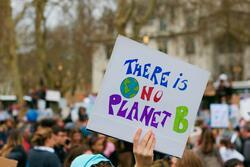Progressive vs. Passive: Why Being Uninformed is the Last Straw
The story probably goes something like this:
The server hands us our drinks, placing a cluster of plastic straws in the center of the table. “Ready to order?” she asks politely.
My friends nod and ask for what they want as they unwrap the single-use plastic.
“Can I have the classic burger with fries please?” I say, preparing to hand her our menus as she finishes writing down our orders.
Meanwhile, three straws have been taken, and one is left for me. I don’t use it, but nobody comments. It’s common knowledge that plastic straws kill the sea turtles, meaning that by now, everyone has heard of plastic straw abstinence. When my burger comes, it is delicious. The end!
Ok, to be honest, I don’t actually remember this happening, but I’ve refused to use a plastic straw before and I’ve also ordered a burger before (even though I usually get something other than the classic with a side of plain fries), so let’s pretend they both happened around the same time. But this story, besides being imaginary (or honestly it’s probably not; it’s more likely that my memory pre-2019, the year California banned single-use straws in restaurants, is failing me), encompasses the mindset I held before I knew that a straw already on the table would be thrown out whether I used it or not, and that livestock are responsible for 14.5 percent of greenhouse gas emissions. Essentially, I thought I was doing something good when I didn’t use the straws on the table when I was really doing nothing. In addition, I could have done what I was trying to do (which was help the environment) by ordering something vegetarian instead of contributing to the growing amount of greenhouse gases in the atmosphere by ordering a burger.
If I hadn’t ordered that burger, maybe it would have been donated to the hungry. But, maybe the meat I didn’t eat was going to be thrown out anyway.
Regardless of what happened to that individual slab of meat, the restaurant probably wouldn’t change the amount of meat they order regularly because I didn’t order a burger that one time.
Or maybe, unbeknownst to me, the ranch from which the restaurant ordered meat, the one I would have supported by eating its product, is invested in sustainable agriculture. Maybe by supporting them I would have been supporting sustainable ranchers who help the environment by doing things like adding small amounts of seaweed to their cow feed to reduce the methane emissions from their cattle by half or participating in other sustainable practices (maybe they plant more trees as a way to give back to the environment or something, I don’t know), therefore supporting sustainable farming and contributing to more eco-friendly business practices.
In these scenarios, eating the burger versus substituting my burger for something vegetarian would make no difference, just like my straw protest, in which case I did nothing wrong (or, necessarily, right) but merely followed my conscience.
However, there’s no way to track the outcome of my hypothetical, singular vegetarian stunt, and I can’t go back now. Even if my heart was in the right place, I was not committed enough to the issue of environmental protection to make the difference I wanted to be making. In order to do that I would have needed more information, and with that information I would have needed to do something bigger.
For example, if I had done even minimal research about the issues I cared about before going to the restaurant, like typing “what do restaurants do with unused straws” into Google search, I would have learned that once a straw has been given to a customer in a restaurant it is usually just thrown away (after googling “do restaurants recycle plastic straws” I also found that many plastic straws cannot even be recycled anyway). Then I would have realized that, if I wanted to ensure one less straw is thrown away because of me directly (instead of potentially not using a straw already on my table, which literally does nothing for the sea turtles), I would make sure to tell my server when I order my drink, at that restaurant and in future ones (or at least not in present-day California, because of the ban and COVID-19), that I would like to receive mine without a straw (and maybe, before we order drinks, I would encourage those dining with me to do so as well).
Similarly, if I had researched the restaurant’s meat suppliers, their commitments to sustainability, and what that restaurant does with its surplus food instead of having to guess as to the origins of my potential lunch, I could have gone to a different restaurant instead if the meat vendor(s) and restaurant waste practices did not seem ethical enough to me, one with more eco-conscious business practices and suppliers focused on giving back. Maybe then I would begin to buy only from more eco-friendly meat suppliers, or maybe, alternatively, I would download an app where I could do something about that food waste myself (and maybe even get a discount while doing it!).
If I had done my research, I would’ve known that consistently ordering vegetarian is more likely to make a positive difference over time and that, at the same time, it should be investigated as vegetarian foods aren’t always more environmentally friendly than other types of food. Then, maybe, the world where I ordered vegetarian would be this one. If I am truly invested in making a difference, I will make the choice to be better informed and make a change in my behavior to better suit my moral agenda.
It’s our responsibility to be informed consumers. We should not passively make infinitesimally small changes to our behavior; this is unlikely to yield the results we want. If I did not order that burger, I might not have made the difference I intended, but I most likely did not do anything bad. And if I consistently do not order burgers or other meat that means I am more likely to make the difference I am hoping to; in this case, the resulting success rate is proportional to the number of times I go vegetarian, which for me is a sacrifice.
By changing my normal, sometimes even giving up what I like, I am setting up a new normal and transforming myself into a person who is not afraid to regularly recalibrate my actions to better align with the poles of my moral compass as I continue to learn.
I really do want to help the environment, and so next time I’ll research the practices of the businesses I plan to buy from. Maybe after all that research I won’t even want a burger. But, more important than any one burger or straw is the fact that challenging myself and committing to making regular changes to my normal behavior so that my actions align with my beliefs will enable me to make a bigger difference than I did before.
This piece was written as part of JWA’s Rising Voices Fellowship.






